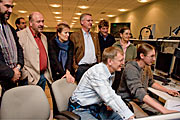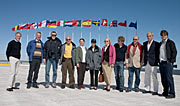Pressemitteilung
Commissioner Potočnik at Paranal Observatory
European Commissioner for Science and Research visits ESO's Very Large Telescope
27. Oktober 2007
As part of his first official trip to Brazil and Chile, the European Science and Research Commissioner, Janez Potočnik, visited Europe's flagship for ground-based astronomy, the ESO Paranal Observatory.
The major facility atop the 2600m high Paranal mountain in the Chilean Atacama Desert is the Very Large Telescope (VLT), whose design, instrument complement and operating principles set the standard for ground-based optical and infrared astronomy. The VLT Interferometer (VLTI) enhances the capabilities of this unique facility even further as do the survey telescopes VST (optical) and VISTA (infrared). Publication statistics show that the VLT provides data for a scientific paper every day, all year round.
The Commissioner was accompanied, among others, by Jaime Pérez Vidal, Head of Delegation of the European Commission (EC) to Chile, Mary Minch and Cornelia Nauen, respectively Director and Principal Administrator of International Scientific Cooperation for the EC, and Hervé Peró, Head of EC Unit Research Infrastructures.
The visitors were able to acquaint themselves with the VLT during an overnight stay at this remote site. The guests were welcomed by the ESO Director General, Tim de Zeeuw, the ESO Representative in Chile, Felix Mirabel, and the Director of the Paranal Observatory, Andreas Kaufer, as well as ESO staff members of many nationalities.
The visitors were shown the various frontline installations at the observatory, including many of the distinctive VLT astronomical instruments that have been built in collaboration between ESO and European research institutes. The Commissioner was provided with a good impression of the wide range of exciting research programmes that are carried out with the VLT.
Having enjoyed the spectacular sunset over the Pacific Ocean from the Paranal platform, the Commissioner visited the VLT Control Room from where the four 8.2-m Unit Telescopes and the VLTI are operated. Here, the Commissioner was invited to participate in an observing sequence at the console of one of the 8.2-m Unit Telescopes of the VLT.
"I've been very impressed with what I've seen at the ESO observatory," said Commissioner Potočnik. "Quite apart from the fascinating science being carried out here, Paranal shows what we can achieve when we work together. It is this sort of co-operative endeavour that I am keen to develop as a result of this visit to Chile."
"I'm delighted about the visit of the Commissioner and to show him first-hand the wonderful science-machine that ESO has designed, has built, and operates for European astronomy", said Tim de Zeeuw. "Indeed, the success of the VLT marks also a success for the European Research Area. With the European participation in the global ALMA project, through ESO, we aim to build on this success and we look forward to taking the next step with the realisation of the Extremely Large Telescope (E-ELT)."
The Commissioner's visit is part of an official trip to Chile and Brazil, both having very strong Science and Technology (S&T) links with the EU. The EU has established an ambitious bilateral relationship with Chile, with an S&T agreement dating back to 2002. ESO, the European Organisation for Astronomical Research in the Southern Hemisphere, has been present in Chile since the mid 1960s.
Weitere Informationen
As set out in its convention, ESO provides state-of-the-art facilities for Europe's astronomers and promotes and organises cooperation in astronomical research. Today, ESO operates some of the world's largest and most advanced observational facilities at three sites in Northern Chile: La Silla, Paranal and Chajnantor. These are the best locations known in the southern hemisphere for astronomical observations. With other activities such as technology development, conferences and educational projects, ESO also plays a decisive role in forming a European Research Area for astronomy and astrophysics.
The ESO Very Large Telescope is the world's most advanced optical instrument, consisting of four Unit Telescopes with main mirrors of 8.2-m diameter and four movable 1.8-m Auxiliary Telescopes. The telescopes can work together, in groups of two or three, to form a giant 'interferometer', allowing astronomers to see details corresponding to those from a much larger telescope. The 8.2-m Unit Telescopes can also be used individually. With one such telescope, images of celestial objects as faint as magnitude 30 can be obtained in a one-hour exposure. This corresponds to seeing objects that are four billion times fainter than what can be seen with the unaided eye.
The first of the Unit Telescopes, 'Antu', went into routine scientific operations on 1 April 1999. Today, all four Unit Telescopes and all four Auxiliary Telescopes are operational, and the VLT has already made a huge impact on observational astronomy.
Kontaktinformationen
Claus Madsen
ESO
Garching, Germany
Tel: +49-171-95 25 603
E-Mail: cmadsen@eso.org
Antonia Mochan
Spokesperson for EC Science and Research
Tel: +32 2 296 99 21, +32 498 96 99 21
E-Mail: antonia.mochan@ec.europa.eu
Sophie Andersson
EC Press Office
Tel: +32 2 295 02 08, +32 498 95 02 08
E-Mail: sophie.andersson@ec.europa.eu
Über die Pressemitteilung
| Pressemitteilung Nr.: | eso0748 |
| Legacy ID: | PR 48/07 |
| Name: | ESO Director General |
| Typ: | Unspecified : People : Other/General |
| Facility: | Very Large Telescope |
Our use of Cookies
We use cookies that are essential for accessing our websites and using our services. We also use cookies to analyse, measure and improve our websites’ performance, to enable content sharing via social media and to display media content hosted on third-party platforms.
ESO Cookies Policy
The European Organisation for Astronomical Research in the Southern Hemisphere (ESO) is the pre-eminent intergovernmental science and technology organisation in astronomy. It carries out an ambitious programme focused on the design, construction and operation of powerful ground-based observing facilities for astronomy.
This Cookies Policy is intended to provide clarity by outlining the cookies used on the ESO public websites, their functions, the options you have for controlling them, and the ways you can contact us for additional details.
What are cookies?
Cookies are small pieces of data stored on your device by websites you visit. They serve various purposes, such as remembering login credentials and preferences and enhance your browsing experience.
Categories of cookies we use
Essential cookies (always active): These cookies are strictly necessary for the proper functioning of our website. Without these cookies, the website cannot operate correctly, and certain services, such as logging in or accessing secure areas, may not be available; because they are essential for the website’s operation, they cannot be disabled.
Functional Cookies: These cookies enhance your browsing experience by enabling additional features and personalization, such as remembering your preferences and settings. While not strictly necessary for the website to function, they improve usability and convenience; these cookies are only placed if you provide your consent.
Analytics cookies: These cookies collect information about how visitors interact with our website, such as which pages are visited most often and how users navigate the site. This data helps us improve website performance, optimize content, and enhance the user experience; these cookies are only placed if you provide your consent. We use the following analytics cookies.
Matomo Cookies:
This website uses Matomo (formerly Piwik), an open source software which enables the statistical analysis of website visits. Matomo uses cookies (text files) which are saved on your computer and which allow us to analyze how you use our website. The website user information generated by the cookies will only be saved on the servers of our IT Department. We use this information to analyze www.eso.org visits and to prepare reports on website activities. These data will not be disclosed to third parties.
On behalf of ESO, Matomo will use this information for the purpose of evaluating your use of the website, compiling reports on website activity and providing other services relating to website activity and internet usage.
Matomo cookies settings:
Additional Third-party cookies on ESO websites: some of our pages display content from external providers, e.g. YouTube.
Such third-party services are outside of ESO control and may, at any time, change their terms of service, use of cookies, etc.
YouTube: Some videos on the ESO website are embedded from ESO’s official YouTube channel. We have enabled YouTube’s privacy-enhanced mode, meaning that no cookies are set unless the user actively clicks on the video to play it. Additionally, in this mode, YouTube does not store any personally identifiable cookie data for embedded video playbacks. For more details, please refer to YouTube’s embedding videos information page.
Cookies can also be classified based on the following elements.
Regarding the domain, there are:
- First-party cookies, set by the website you are currently visiting. They are stored by the same domain that you are browsing and are used to enhance your experience on that site;
- Third-party cookies, set by a domain other than the one you are currently visiting.
As for their duration, cookies can be:
- Browser-session cookies, which are deleted when the user closes the browser;
- Stored cookies, which stay on the user's device for a predetermined period of time.
How to manage cookies
Cookie settings: You can modify your cookie choices for the ESO webpages at any time by clicking on the link Cookie settings at the bottom of any page.
In your browser: If you wish to delete cookies or instruct your browser to delete or block cookies by default, please visit the help pages of your browser:
Please be aware that if you delete or decline cookies, certain functionalities of our website may be not be available and your browsing experience may be affected.
You can set most browsers to prevent any cookies being placed on your device, but you may then have to manually adjust some preferences every time you visit a site/page. And some services and functionalities may not work properly at all (e.g. profile logging-in, shop check out).
Updates to the ESO Cookies Policy
The ESO Cookies Policy may be subject to future updates, which will be made available on this page.
Additional information
For any queries related to cookies, please contact: pdprATesoDOTorg.
As ESO public webpages are managed by our Department of Communication, your questions will be dealt with the support of the said Department.


